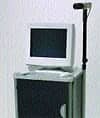Apnimed today announced positive topline results from the MARIPOSA Phase 2b trial, an efficacy, safety, and dose-finding study of one-month duration of its lead drug candidate for obstructive sleep apnea, AD109 (atomoxetine + aroxybutynin).
The primary endpoint showed a statistically significant reduction in the apnea-hypopnea index (AHI) for both doses studied (p<0.001 versus placebo). Results from the MARIPOSA trial also demonstrated that AD109 improved daytime symptoms caused by obstructive sleep apnea (OSA) and was safe and well-tolerated. Results from this study support dose and endpoint selection for Apnimed’s phase 3 studies of AD109, anticipated to start in the first half of 2023, following discussions with the US Food and Drug Administration (FDA).
“MARIPOSA results support the therapeutic potential of AD109 as a convenient, nightly treatment for OSA, which would represent a major breakthrough in the management of this serious disease,” says Paula Schweitzer, PhD, an investigator in the MARIPOSA trial and the director of research at St. Luke’s Sleep Medicine and Research Center in Chesterfield, Mo. “Improved nighttime breathing and sleep, and improved daytime fatigue were observed, which have the potential to dramatically improve quality of life.”
Ron Farkas, MD, PhD, chief medical officer of Apnimed, says in a release, “MARIPOSA was a large study that we believe provides compelling evidence, along with earlier Apnimed studies, of AD109’s potential to improve the lives of people with OSA. We plan to request an end of phase 2 meeting with FDA shortly to obtain further clarity on Phase 3 and our subsequent marketing application for AD109.”
MARIPOSA included a total of 294 participants with a range of OSA severity, from mild to severe at 25 sites across the United States. Participants were randomized to parallel arms comparing two doses of AD109, two doses of AD504 (a second candidate in an earlier phase of development), atomoxetine alone, and placebo. Enrollment was open both to treatment-naïve participants and to the substantial proportion of OSA patients who are unwilling or unable to tolerate treatment with positive airway pressure devices.
MARIPOSA was also designed to incorporate other standard clinical endpoints designed to characterize improvement of oxygenation, sleep, and daytime function in OSA.
Patients assigned to the dose of AD109 studied in prior Apnimed trials (atomoxetine 75mg/aroxybutynin 2.5mg) saw a large and statistically significant (p<0.001) reduction in AHI4 at one month vs placebo. These results are consistent with Apnimed’s prior Phase 2 studies of AD109.
In the MARIPOSA trial, AHI4 was reduced from a median of 20.5 to 10.8 events/h in the AD109 75mg/2.5mg dose arm and reduced from 19.4 to 9.5 events/h in the AD109 75mg/5mg arm. Overall, 41% of participants who completed the study achieved an AHI below 10 when treated with AD109; 44% had a greater than 50% reduction from baseline, and 15% of treated patients had an 80% or greater reduction. The AHI reduction benefit occurred across the entire night unlike current standard of care therapies such as CPAP that are often used for only part of the night.
The MARIPOSA topline results also support the potential of AD109 to improve daytime symptoms caused by OSA. MARIPOSA was designed to explore several scales used to measure symptoms important to OSA patients’ daily function and quality of life. These scales are important for designing the Phase 3 studies required for approval of AD109. On the Epworth Sleepiness Scale (ESS), a 5-point decrease in median ESS over one month from 12.0 to 7.0 was observed with AD109 (atomoxetine 75mg/aroxybutynin 2.5mg) compared to a 2-point decrease observed for placebo. On a scale called PROMIS-Fatigue (suggested to Apnimed by FDA), statistically significant improvement on AD109 (atomoxetine 75mg/aroxybutynin 2.5mg) vs placebo (p<0.05) was observed. AD109 also demonstrated a trend towards statistical significance on scales measuring other important OSA symptoms.
There were no serious adverse events and no new or unexpected adverse events in the MARIPOSA trial. The most common adverse events in patients treated with AD109 were dry mouth, insomnia and nausea.
Apnimed hopes to advance the AD109 atomoxetine 75mg/aroxybutynin 2.5mg dose into phase 3, following discussions with FDA.
MARIPOSA also included an exploratory sub-study of two doses of AD504, a second investigational oral medication being developed by Apnimed. These studies revealed promising efficacy in OSA as well.
AD109 has been granted Fast Track designation by the FDA.
Photo 68277139 © Rido | Dreamstime.com




